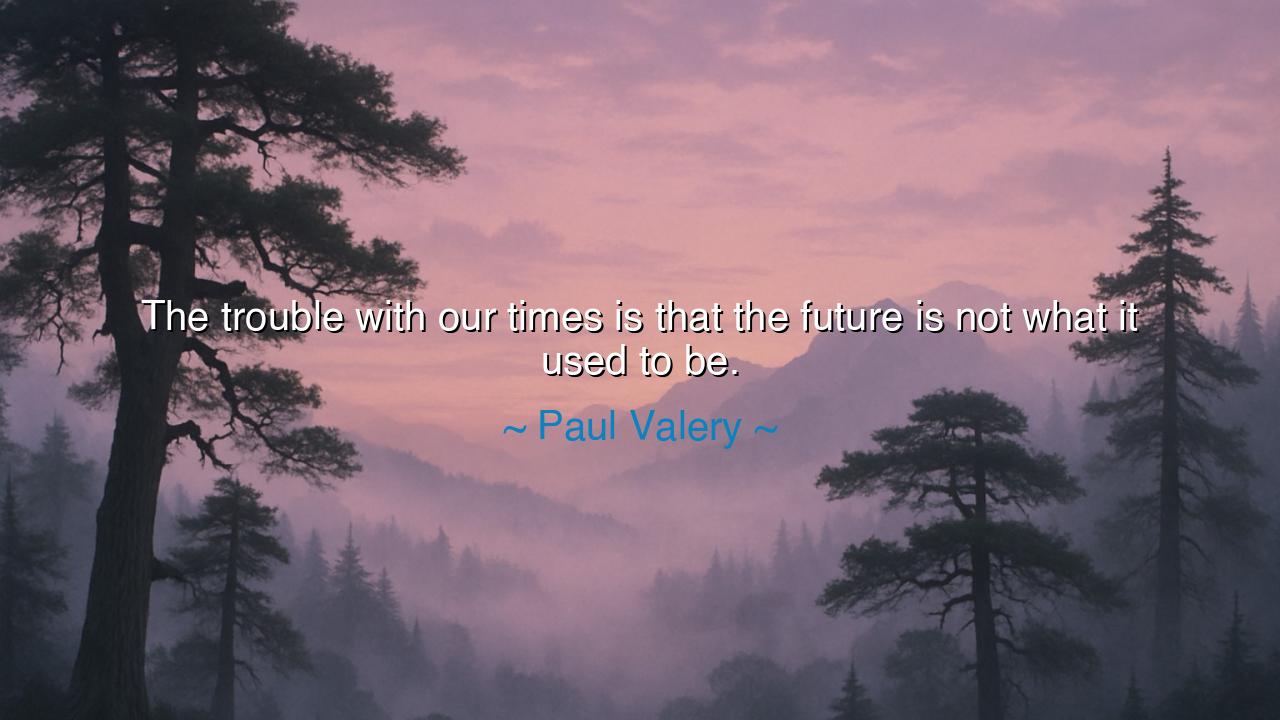
The trouble with our times is that the future is not what it used






“The trouble with our times is that the future is not what it used to be.”
— Paul Valéry
These haunting words of Paul Valéry, the French poet and philosopher, carry the weight of an age disillusioned by its own progress. Once, humankind looked toward the future as a horizon of light, a realm of promise and perfection. The dreamers of old believed that time itself was a ladder—that each century would lift humanity higher, toward wisdom, peace, and beauty. But as Valéry gazed upon the shattered Europe of the twentieth century, he saw that the dream had dimmed. The future, once radiant and pure, had become uncertain, clouded by the very inventions and ambitions that were meant to save us. Thus, he spoke this lament: “The trouble with our times is that the future is not what it used to be.”
To understand his meaning, one must feel the tremor of his century—the world that had just emerged from the fires of World War I, a war that broke the spine of human optimism. Before that war, the future had seemed like a straight road, lit by the torches of science, reason, and industry. The thinkers of the Enlightenment believed in inevitable progress, that humanity would grow more civilized with each invention, each discovery. But the very tools of progress—the machine, the engine, the factory—were turned to destruction. The same mind that could split the atom could also shatter a city. And so Valéry, standing amid the ruins, saw that the future could no longer be trusted as a promise—it had become a question.
Yet Valéry’s words are not merely the sorrow of one age; they are the mirror of all ages when faith in the future falters. Every generation builds its hopes upon the next, imagining that their children will inherit a better world. But when the heart of humanity forgets its wisdom and builds without virtue, progress becomes peril, and dreams become chains. The trouble with our times, then and now, is not that the future has changed—it is that we have changed. We have lost the clarity of vision that once bound hope to responsibility, innovation to morality, knowledge to humility.
Consider the story of the Tower of Babel, that ancient myth of ambition and confusion. Mankind, united in purpose, sought to build a tower to the heavens—to touch the divine with the hands of flesh. But in their pride, they forgot reverence. The tower crumbled, and their tongues were scattered. So too, in modern times, we build our towers—of technology, of wealth, of knowledge—yet forget the sacred ground upon which they stand. The future, without wisdom, becomes the new Babel: higher, but emptier; brighter, but colder. And so Valéry’s lament becomes prophecy—the future we imagined is lost, replaced by one we cannot understand.
Still, his words do not call us to despair—they call us to awakening. If the future is not what it used to be, then it is ours to reshape. The path forward need not repeat the mistakes of the past. The ancients taught that the soul must return to balance before the world can heal. So too must we return to the fundamentals of humanity: compassion, courage, humility, and truth. These are the materials of a real future—one that grows not from machines and markets alone, but from hearts that remember their divine purpose.
Let us look again upon the meaning of “the future.” It is not a distant land waiting for us; it is the child of our present deeds. What we sow now, in our thoughts, our choices, our treatment of one another, becomes the fruit of centuries. If the future seems darker now, it is not because time has betrayed us—it is because we have dimmed the flame of meaning that once lit our way. To restore the promise of tomorrow, we must live nobly today, as guardians of what is yet to come.
So, my listener, take this truth to heart: the future is not written by prophets or powers, but by the small acts of the living. When you act with integrity, you restore the future. When you speak truth amidst deceit, you purify it. When you choose kindness in a world of cruelty, you heal it. This is how you rebuild what Valéry mourned—how you make the future what it ought to be once more. For though the poet saw only shadows, the light still remains in those who remember that hope, like time itself, must be renewed in every generation.






AAdministratorAdministrator
Welcome, honored guests. Please leave a comment, we will respond soon